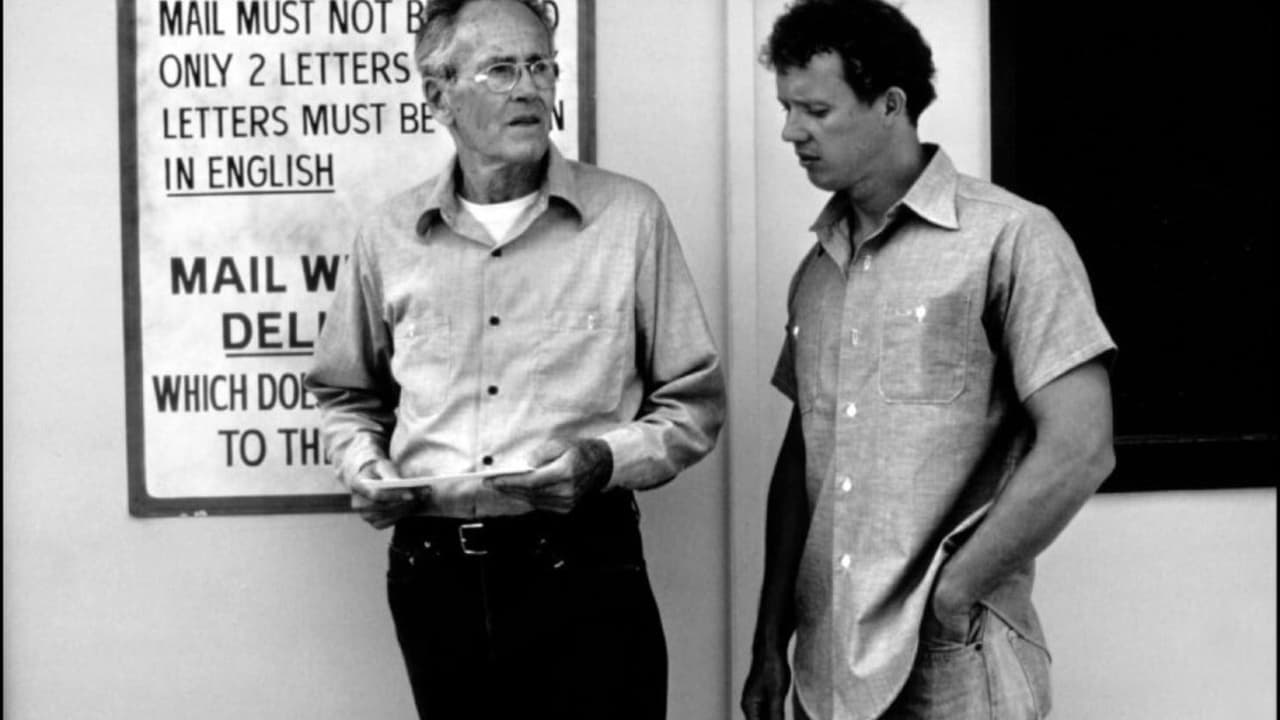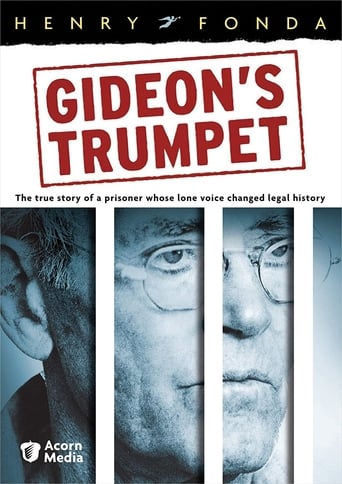

Found sitting in a bar drinking a beer with a ton of loose change in his pocket, the dour Henry Fonda is arrested and charged with a robbery in another bar where a pinball machine and pool table were emptied of its cash. He is not given an attorney and as a result, defends himself, quickly bringing in a guilty verdict. Incarcerated, Fonda spends every waking moment in the prison library studying the law, and every prisoner watches and waits as he handwrites a letter to the state supreme court to have the verdict overturned. What happens then is the turn around of laws, showing that on occasion, a man in a loosing situation can be the winner.Just a year before his spectacular Oscar Winning performance in "On Golden Pond", Fonda gave another bravura performance, showing that like many other great actors throughout history, giving a great performance can look extremely easy. While this television film looks liked a filmed stage play, it is certainly never stagey, and that is because you really are interested in seeing how justice is done, even if you are never sure of his guilt or innocence. Fonda is surrounded by a brilliant cast, including Jose Ferrer, Fay Wray, Dolph Sweet, Dolph Sweet, Sam Jaffe and Dean Jagger. Like other great trial dramas (most notably, Fonda's 1956 classic "The Wrong Man"), this is not about finding the guilty party, but simply seeing justice done as the American constitution has promised it would be.
... View MoreThe story of Clarence Earl Gideon illustrates the fact that even the humblest and least noble of people in the right circumstances can influence things far beyond their grasp. Gideon was certainly in humble circumstances and was not a noble character by any means.But what he was entitled to is to be represented by counsel when he was arrested for a robbery of a pool hall in a small town in Florida. Gideon was no stranger to the criminal justice system, he'd served time for numerous minor offenses before. But his efforts to defend himself without an attorney resulted in his conviction.What Gideon did was appeal directly to the US Supreme Court and they took his case and Gideon won the right to be retried with a court appointed lawyer. It was also a 9-0 decision, not something arrived at every day in important cases.Henry Fonda plays Gideon and the Seventies were not a good decade for him on screen. He sold the value of his box office name for the money and appeared in a lot of junk quite frankly. Until his final Oscar on the big screen for On Golden Pond, this Hallmark Hall of Fame television drama was probably Fonda's best work in the Seventies and might have been his epitaph, but for that. You can see this man clearly as someone who forty years earlier might well have been Tom Joad.Abe Fortas who represented Fonda at the Supreme Court is played by Jose Ferrer and Ferrer even looks like Fortas who was the consummate Washington insider. His later downfall doesn't change the fact that his was one of the most brilliant legal minds of the last century. On the local level Fonda as Gideon is represented finally in court by Lane Smith who plays his attorney in the folksy Ben Matlock style popularized by Andy Griffith.The Supreme Court who is nameless has such folks as Sam Jaffe and Dean Jagger on the bench and the Chief Justice is John Houseman. Of course the Chief Justice was Earl Warren and Houseman plays it more like his law professor Kingsley in The Paper Chase. Earl Warren was a far more down to earth individual than Houseman ever was on screen and in real life. Making her farewell appearance as Fonda's landlady is Fay Wray, she of the big ape. She gives testimony at his new trial she wasn't allowed to give at the first travesty. The right to counsel is a sacred one and the Supreme Court has made it so by the humble pleadings of one of the Creator/Deity's lesser creations in Clarence Earl Gideon. Greatness can and does exist in some strange places.
... View MoreIn another review, I stated that the "Hallmark Hall of Fame" series was never as good during the last twenty years or so as it had been during its glorious days in the 1950's and '60's. There was one brilliant exception, however, and this is it. "Gideon's Trumpet" can stand up proudly alongside all the other "Hall of Fame" episodes of the past as one of the finest made-for TV films ever made.It tells the true story of Clarence Earl Gideon, an ex-convict who, in the early 1960's, was accused of breaking into and robbing a convenience store in Florida. Claiming innocence, he was forced to serve as his own lawyer because states' laws at that time did not require an accused person to be automatically given a lawyer. Failing miserably at his own defense, he was sent to prison, where, as a model prisoner, he studied up on law and petitioned the U.S. Supreme Court for the right to be granted a lawyer.This phrase has already become a cliché from overuse, but Henry Fonda, in one of his last performances, does not play Clarence Gideon--he IS Clarence Gideon. He inhabits the role so completely that we never believe we are watching Henry Fonda; we believe we are seeing a poor, inarticulate, awkward, somewhat cranky, but basically kind man named Clarence Gideon. Fonda utterly lives the role in a way that he seldom does in his other films (although he was an excellent actor).The other actor who gives a memorable performance is José Ferrer, as Abe Fortas, who pleads Fonda's petition before the Supreme Court. As Fortas, Ferrer gets to do one of the things he does best, and which he had not done to my knowledge since playing "Cyrano de Bergerac"--deliver a long, impressive speech. I don't know how much of the speech was actually taken from the Court hearing and how much was written by the excellent screenwriters, but there are few things as satisfying as an actor who not only gives a great performance, but also delivers a long speech beautifully. The thrill of hearing Ferrer's rich, beautiful voice argue a case before the Supreme Court is enough reason for me to tune in to this film every time it is shown on TV.There is also a cameo from Fay Wray, as Fonda's longtime landlady, and the other Justices of the Court, all of whom are also excellent, consist of such familiar faces as John Houseman, Sam Jaffe, Dean Jagger, and other familiar character actors from television.This great production might strike some viewers brought up only on action films as boring--there is no action at all in it; it's like watching a filmed play--but, believe me, there is not a single boring moment in it, if you appreciate well-written characters and dialogue. And this film avoids all of the drippy sentiment that has plagued "Hallmark Hall of Fame" over the last six years or so. If only this anthology series had stayed on the level of "Gideon's Trumpet".
... View MoreWatching this flick I kept mulling over how many actors had played lawyers in other movies. Let's see. Lane Smith, of course, in "My Cousin Vinnie" (and "Nixon," I guess), John Houseman in "The Paper Trail," Dean Jagger in "Twelve O'Clock High," Jose Ferrer in "The Caine Mutiny" and "Blood and Orchids," and probably others that I've missed. I kept waiting for E. G. Marshall and John Williams to pop up. Henry Fonda, certainly, brought resonance to his role as well. He was the unjustly convicted Manny Balistrero in "The Wrong Man." And he, too, was a lawyer in "Young Mr. Lincoln." This is pretty well done, both technically and thematically. It's an important story and is refreshingly free of stereotypes. The Florida court that convicts Fonda of burglary is a just one and operates under the law, as it then existed. And Fonda is no rabble rousing spokesman for the little man either. He's been in prison 5 times before, for crimes such as burglary and "possession of government property." (I'd like to hear more about that.) He's not doing this so that "all men will be free" or any of that bunkum. He's doing it because he's angry at having been denied a lawyer simply because he couldn't afford one.As he labors over the law books in the prison library, he shows concern only over the fate of one other inmate, a black guy. This is one of those instances in which the story looks a little corny. Here, and where the writers give Clarence Earl Gideon the charisma of Cool Hand Luke with the other prisoners, an increasing number of them, following him back and forth to the mailbox and the warden's office and cheering loudly when the Supreme Court agrees to his request. (I don't believe they cheered for another man's success; I don't believe the writers ever met an inmate or saw the inside of a penitentiary.) The production had a bit of a problem with the focus puller too. But, that aside, this is really pretty instructive. The Supreme Court evidently agreed to review his case not because they felt sorry for him but because they felt ready for a change in the existing rules about due process. Gideon was the right man in the right place. Luck had a lot to do with his success. Equally interesting is Fonda's performance. He was never a ham and was always minimally expressive. It works here because Gideon is played as a grouchy, angry, taciturn loner who minds his own business. A lesser script would have made him bombastic and articulate but this Gideon stumbles over words while reading aloud. The scene in which Fonda chokes up when he receives the news from Abe Fortas about the Court agreeing to review his case is as moving as it is because Fonda underplays it. Dare I suggest that in this film, playing a skinny, tattooed, unfriendly convict, he does a better job than he did in his convict's role in Hitchcock's movie? Or even that this is one of his best performances, period? The photography and locations are pretty good too. The stale, almost empty courtroom during Fonda's trial, the silence and boredom of all involved, rather match the almost sensible heat of the Florida summer and the interiors baking under the sun. Lane Smith, as Fonda's counselor in his retrial, is simply great -- sneaky and dark, almost villainous in the glee with which he attacks the prosecution's witnesses and frees Fonda. What a contrast to his performance as the affable prosecutor in "My Cousin Vinnie." Hallmark Productions are often soporific or -- let me say -- family oriented, but this one makes a few demands on a viewer, all for the good. Watch it if you have the chance. It doesn't seem to be on very often.
... View More